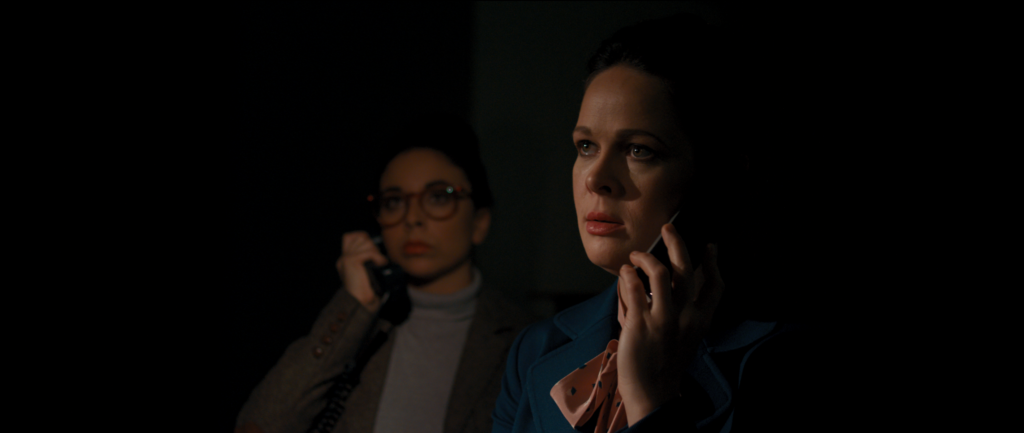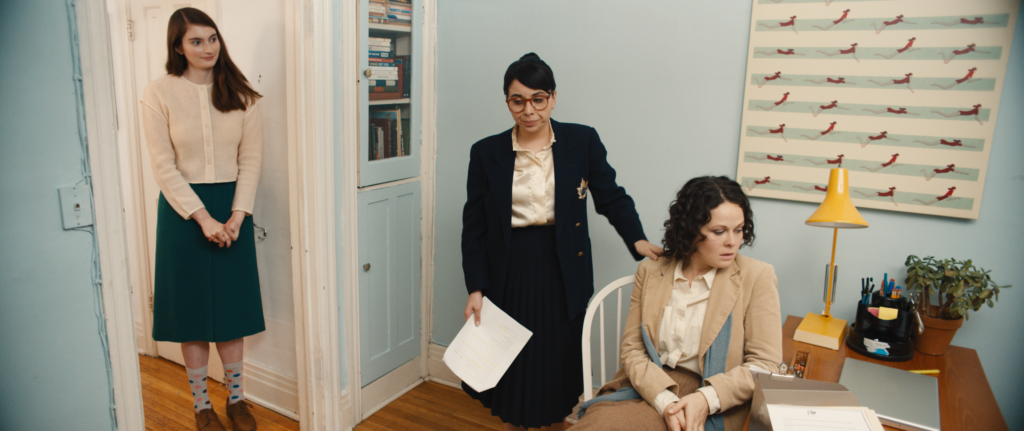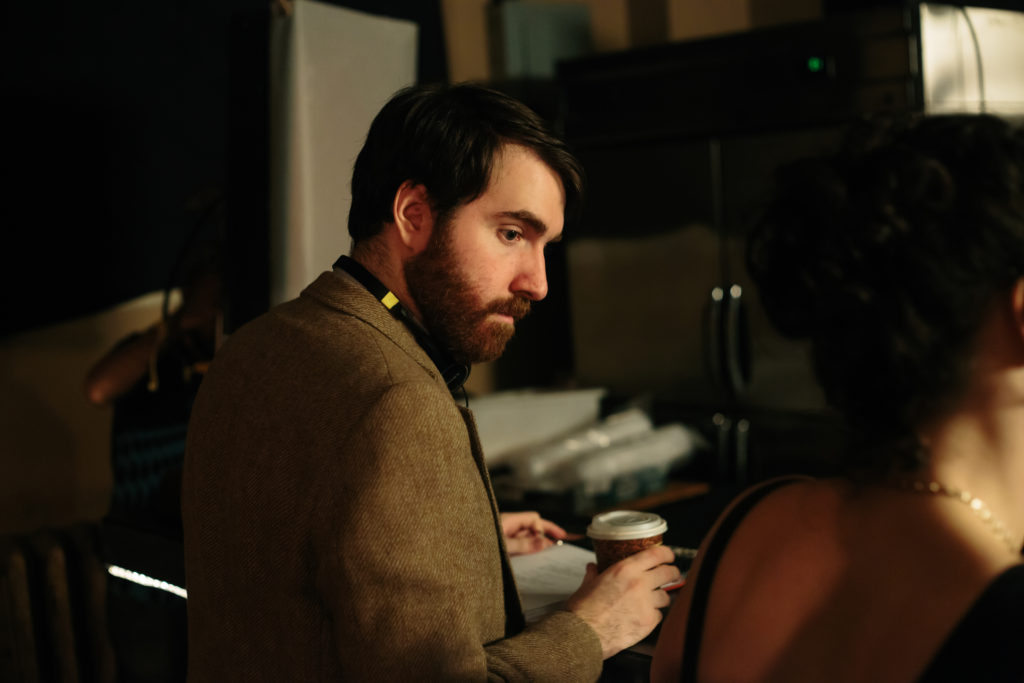Reviews include Irena’s Vow, The Beast, and Before I Change My Mind.
An Interview With: Daniel Warth
March 29, 2017
We open in the soulless confines of a corporate seminar room.
A speaker, distinct only by being indistinguishable, wraps up his presentation, collapses the collapsible movie screen, and announces, with no particular flair, a special dramatization about customer relations. A desk and two phones are pushed onto a makeshift stage. A shot of a small group of bored entry-level employees, pens and notebooks resting on their laps, look on. The fluorescent lights dim. Two women step out to reenact a routine customer/employee exchange. This is nothing more than a corporate teaching tool, and yet the women on stage give a performance worthy of Eugene O’Neill or Henrik Ibsen. Their commitment is commendable, if not somewhat delusional.

Welcome to Dim the Fluorescents, Daniel Warth’s feature film debut that won Slamdance’s Grand Jury Prize back in January.
Directing from a script he co-wrote with Miles Barstead, Toronto-based Warth has made a film about artistic integrity, the conflict of partnership, and the individual growth and ambitions that can divide and conquer relationships.
Thom Ernst met Warth at a popular neighbourhood pub in Toronto to chat his recent success, how it got made, and where the emerging filmmaker is going next.
Thom Ernst: It’s a feat to premiere your work at a well-known festival; a bigger one to win it entirely. Is this the dream?
Daniel Warth: From a very young age, I was inexplicably confident that I would be a filmmaker. I made shorts in grade school; I wrote three features in high school, there wasn’t the slightest doubt. It wasn’t until my early twenties – when I didn’t get into some festivals – that I began to realize success was not a guarantee. Our industry is an immensely discouraging one, but the lack of support was oddly liberating because it meant I was working outside the system, trusting my own instincts and just trying to make the best movie possible, even if that meant taking a few years to do so. The film’s success has only bolstered my stubbornness, and now, for the first time since my aforementioned youth, I feel I can confidently say, “I’m a filmmaker.”
The film defies a genre classification. But let’s try.
It doesn’t necessarily fit into a specific cinematic tradition, but I can certainly tell you about some of the films that inspired it. Right from having the initial idea for the film, my co-writer Miles Barstead and I were talking about John Cassavetes’ Opening Night. We wanted to make that kind of harrowing backstage drama about a stage actor pouring all of her passion and energy into her role, except that the role was in a corporate role-playing demonstration. I would say the single most influential filmmaker for me was Jonathan Demme. Miles and I wanted to write a script that had the tone and structure of his early comedies (such as Citizens Band, Melvin and Howard, or Something Wild), with the emotional directness of something like Rachel Getting Married. And then, when it came time for me to direct the performance sequences, I looked at Stop Making Sense and Swimming to Cambodia, because I think Demme is the absolute best at capturing live performances cinematically. The other major influence was Jane Campion, particularly Sweetie, because of the way it captures a fractious and emotionally complex relationship between two people in a way that’s funny, tragic and so visually stylish.

Talk to me more about Opening Night. Is there a similarity between someone’s onstage performances with whatever is going on internally?
Absolutely. Opening Night definitely inspired the structure, in that we wanted to create a backstage drama of unresolved tensions that finally come out on stage, blurring the lines between character and actor. The way this unfolds in Dim the Fluorescents—or in Opening Night, for that matter—is obviously more heightened than what an actor typically experiences (I hope), but when actors pour so much of themselves into a role, the distinction between them and their character is not only indiscernible, but also kind of moot. In that moment, they are both experiencing the same thing.
Is that what you would describe as the film’s main theme?
The film has a lot to do with performance, both in the literal sense of what an actor does and in the broader sense of how performativity figures into our daily lives. An actor at the early stages of their career kind of exemplifies both because, in order for success to be attainable, an actor has to project confidence despite their justifiable uncertainty. On the other hand, they have to be open enough to bring genuine emotions into their performances. So I was interested in this paradoxical idea that, when life demands that you behave in all of these performative ways, only fiction allows to express yourself honestly. That dichotomy opened up all of these narrative and formal possibilities that excited me greatly.
The film dances delicately between drama and comedy without having to suffer the blended term: dramedy. What directions did you give the cast and crew in order to maintain balance?
I think that balance is just inherent to the idea of people channeling their unrealized dreams into corporate role-playing demonstrations. An approach that skewed entirely to one emotional extreme or the other would have felt incomplete to me, but maybe that’s just how I perceive the world. The potential to evoke a wide array of emotional responses within a single work is exciting to me, and it’s one of the things that drew me to this idea in the first place. I tend to prefer things that are both funny and sad, whether they’re films or books or plays or whatever.

In terms of maintaining the tone on a day-to-day basis during the shoot, I had a slight advantage because of my process. I worked with a locked script and planned out all of the shots in advance, so it’s maybe easier to locate where each scene fits into larger emotional trajectories. It’s a totally intuitive thing for me on the day, deciding what feels right for each scene and imagining how it’s all gonna work together in the finished film. It always feels like Slaughterhouse Five trying to shoot a movie out of chronological order, so, you just do your best to think about what came before and what comes next, and trust your gut about what feels right for each moment.
What kind of budget were you working with?
Quite a low one. The Ontario Arts Council was the only agency that supported us going into production; we couldn’t get anything from any of the other major funding bodies. The film was very much a labour of love… and debt. The core group of us weren’t paid a thing, so we had to take other work and/or be broke throughout the making of the film.
So, perhaps Slamdance is the best place to debut that kind of work.
It’s an incredibly supportive festival. The staff and programmers have all seen your film and seem to really know it well and love it. And you bond with your fellow filmmakers quickly, because you’re all going to each other’s movies and filmmakers are throwing parties at their houses.

Is there a badge of honour in playing a festival that some still see as being outside of the mainstream? Or, in this case, across the street from Sundance?
I think film lovers have a love-hate relationship with the bigger festivals, because they tend to mostly program films by well-established filmmakers – which, of course, we all want to see – but they don’t necessarily introduce the film world to directors much anymore. Slamdance, on the other hand, has a history of launching the careers of some really interesting filmmakers. Within the Canadian film community, Slamdance certainly has a lot of respect, and Slamdance programs a lot of Canadian films, so I guess the respect is mutual.
Were you surprised Dim the Fluorescents did so well?
I expected people to like the film, as, I suppose, you have to when you show your film somewhere. But I certainly didn’t go in expecting to win the Grand Jury Award. I thought we were flying under the radar a bit compared to other films that were getting more industry attention, so it was the most amazing surprise. I don’t remember my acceptance speech at all, but I have a feeling it wasn’t very good. Winning that award is one of the most exciting things that’s ever happened to me, so I hope I was able to articulate that in the moment. The win helped us secure our Canadian distribution deal with Films We Like, and it’s prompted other production companies and funding bodies to express interest in working together on future projects, both of which are genuinely unprecedented for me.
What’s next for you?
Right now I am simultaneously developing a feature and a television series, so I will see which one gets funding first and most likely jump onto that one next. I like both ideas, so I’ll be happy either way. I’m excited to move away from the distribution/sales side of filmmaking and back into the creative side, which I can now confirm I strongly prefer.



